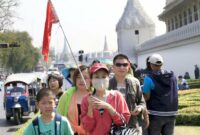Elderly travel tours offer a unique opportunity for seniors to experience the world, fostering independence, social connection, and enriching life experiences. These tours cater to diverse needs and preferences, ranging from adventurous expeditions to relaxing cruises, ensuring a comfortable and fulfilling journey for every traveler. Careful planning and consideration for accessibility and health are paramount, ensuring a safe and enjoyable trip. This exploration delves into the various facets of elderly travel, from tour types and accessibility to health considerations and effective marketing strategies.
We’ll examine the different types of tours available, highlighting the unique benefits of each. We will also address crucial aspects like accessibility, health and safety, and the importance of thoughtful itinerary design. Finally, we will look at effective marketing and promotion strategies to reach this specific demographic.
Types of Elderly Travel Tours
Choosing the right travel experience is crucial for ensuring a safe, enjoyable, and memorable trip for senior travelers. Many factors influence this decision, including the traveler’s physical capabilities, interests, and budget. This section categorizes elderly travel tours based on activity level, travel style, and destination type to help you find the perfect fit.
Elderly Travel Tour Categories
The following table categorizes various elderly travel tours, considering activity levels, travel styles, and destination types. This categorization assists in matching senior travelers with suitable options based on their preferences and physical abilities.
| Activity Level | Travel Style | Destination Type | Tour Description & Benefits |
|---|---|---|---|
| Relaxed | Cruise | Coastal/Island | Enjoy leisurely days at sea, with minimal physical exertion. Onboard amenities and shore excursions cater to diverse interests, offering a comfortable and convenient travel experience. Benefits include reduced physical strain and opportunities for socialization. Example: A Caribbean cruise featuring gentle shore excursions and onboard entertainment. |
| Moderate | Coach Tour | Historical Cities | Combines guided sightseeing with comfortable coach transportation. Includes planned walking tours at a manageable pace, with ample rest stops. Benefits include structured itineraries and the convenience of group travel. Example: A tour of European capitals, with guided walking tours of major historical sites and comfortable overnight accommodations. |
| Active | Independent Travel | National Parks | Provides more freedom and flexibility, allowing seniors to explore at their own pace. Requires a higher level of physical fitness and independence. Benefits include personalized experiences and greater control over the itinerary. Example: A self-guided tour of a national park, with pre-booked accommodations and rental car. |
| Relaxed | River Cruise | Scenic Waterways | Offers a tranquil and scenic travel experience with minimal physical activity. Features onboard amenities and gentle excursions along the riverbanks. Benefits include a peaceful atmosphere and breathtaking views. Example: A Rhine River cruise, featuring onboard lectures and leisurely sightseeing along the river. |
| Moderate | Small Group Tour | Cultural Destinations | Provides a more intimate and personalized travel experience compared to large group tours. Includes guided tours and visits to cultural sites at a manageable pace. Benefits include a more immersive experience and greater interaction with fellow travelers and local guides. Example: A small group tour of Italy, focusing on art, history, and cuisine. |
| Relaxed | All-Inclusive Resort Stay | Beach Destinations | Offers a hassle-free vacation with all meals, activities, and accommodations included. Minimal physical activity required, ideal for those seeking relaxation. Benefits include convenience and stress-free travel. Example: A week-long stay at an all-inclusive resort in the Caribbean, with access to beaches, pools, and restaurants. |
Comparison of Tour Operators for Elderly Travel
Selecting a reputable tour operator is vital for a successful elderly travel experience. The following table compares several tour operators known for their services catering to senior travelers, highlighting their strengths and weaknesses. Note that these are general observations and individual experiences may vary.
| Tour Operator | Strengths | Weaknesses |
|---|---|---|
| Operator A (Example) | Excellent customer service, well-organized itineraries, focus on accessibility | Potentially higher prices, limited destination choices |
| Operator B (Example) | Wide range of destinations, diverse activity levels offered, competitive pricing | Customer service may vary, less emphasis on accessibility features |
| Operator C (Example) | Specialized itineraries for seniors, excellent medical support, highly experienced guides | Smaller selection of tours, potentially less flexible itineraries |
Accessibility and Inclusivity in Elderly Travel
Providing accessible and inclusive travel experiences for older adults is paramount to ensuring they can enjoy the benefits of travel and exploration. This involves careful consideration of various factors impacting their comfort, safety, and overall participation. A truly inclusive approach recognizes the diverse needs and abilities within the elderly population, moving beyond simply meeting minimum accessibility standards.
Transportation Accessibility
Ensuring easy and comfortable transportation is crucial. This includes readily available and accessible modes of transport such as wheelchair-accessible vehicles, buses with ramps and designated seating, and clearly marked routes within airports and train stations. Consideration should also be given to the duration of travel and the frequency of rest stops. For example, a tour might incorporate shorter travel days with opportunities for breaks, rather than long, tiring journeys. Pre-booked transportation, including airport transfers, can also alleviate stress and confusion.
Accessible Accommodation
Hotels and other accommodations should offer a range of accessible rooms featuring features such as roll-in showers, grab bars, adjustable beds, and wider doorways. Clear and easy-to-understand signage is also essential. Tour operators should verify the accessibility features of accommodations beforehand and provide clear information to travelers. For instance, providing detailed descriptions of room features and accessibility amenities on the tour brochure or website will help travelers make informed decisions.
Activity Options and Inclusivity
Activities offered should cater to a range of physical abilities and interests. This means providing options for both active and less strenuous participation. A walking tour might offer alternative transportation options for those with mobility limitations, while a museum visit could include provisions for those needing more frequent rest periods or alternative seating arrangements. The pace of activities should be manageable and allow for flexibility. For example, offering shorter walking distances with rest points or providing alternative, seated options for activities.
Inclusive Travel Practices Checklist for Tour Operators
Before embarking on a tour, tour operators should consider the following:
- Pre-Trip Communication: Provide clear and detailed information regarding accessibility features and support available throughout the trip. This includes contact information for support staff and detailed itineraries outlining the pace and accessibility of activities.
- Transportation Accessibility: Confirm the accessibility of all transportation methods used, including vehicles, airports, and train stations. Arrange for necessary assistance such as wheelchair transfers.
- Accommodation Accessibility: Verify the accessibility features of all accommodations and provide clear descriptions to travelers. Ensure sufficient time is allocated for transfers and check-in.
- Activity Accessibility: Offer a range of activities suitable for different levels of mobility and fitness. Provide alternative options for those with limitations.
- Staff Training: Train staff on how to provide sensitive and respectful assistance to elderly travelers with diverse needs.
- Emergency Preparedness: Have clear protocols in place to handle medical emergencies or other unforeseen circumstances.
- Feedback Mechanisms: Establish clear channels for travelers to provide feedback and identify areas for improvement.
Health and Safety Considerations for Elderly Travelers
Planning a travel experience for senior citizens requires careful consideration of their health and safety. A proactive approach, encompassing pre-trip preparation and ongoing vigilance during the journey, ensures a comfortable and secure trip for everyone. This section details crucial aspects to address before, during, and after the tour.
Safe and healthy travel for older adults involves a multi-faceted strategy. It begins with thorough planning and extends to meticulous attention to detail throughout the trip. This includes not only addressing potential medical issues but also considering environmental factors and practical arrangements that enhance safety and well-being.
Pre-Trip Medical Consultations and Emergency Preparedness
Prior to embarking on any tour, a comprehensive medical consultation with the traveler’s physician is paramount. This consultation should cover existing medical conditions, necessary medications, potential risks associated with travel, and recommended preventative measures. Discussions should include the specific itinerary and any potential environmental challenges, such as extreme temperatures or high altitudes. The physician can provide necessary documentation, including prescriptions and a summary of medical history, for easy access during the trip. Furthermore, it’s crucial to establish a clear communication plan with family or emergency contacts, including designated individuals who can be reached in case of an emergency. A well-defined emergency contact list, with contact information readily available, should be carried at all times.
The Role of Travel Insurance and Medical Assistance Services
Comprehensive travel insurance is not merely a recommendation but a necessity for elderly travelers. It provides financial protection against unforeseen medical emergencies, trip cancellations, and lost luggage. Policies should ideally cover medical evacuation, repatriation, and emergency medical expenses. It’s vital to choose a policy with extensive coverage tailored specifically to the needs of senior citizens and the itinerary’s characteristics. Moreover, investigating and selecting a reputable medical assistance service is highly recommended. These services can provide 24/7 access to medical advice, emergency assistance, and coordination of medical care in unfamiliar locations. The peace of mind provided by such services is invaluable.
Potential Health Concerns Specific to Elderly Travelers and Preventative Measures
Several health concerns are more prevalent among older travelers. Understanding these risks allows for proactive preventative measures.
It’s important to acknowledge that the specific needs will vary from person to person. The following list is not exhaustive but highlights common concerns and suggests preventative strategies.
- Cardiovascular Issues: Heart conditions are a major concern. Preventative measures include regular medication adherence, monitoring blood pressure, avoiding strenuous activity, and staying hydrated.
- Respiratory Problems: Asthma, COPD, and other respiratory conditions can be exacerbated by travel. Travelers should carry necessary inhalers or medications and be mindful of air quality and potential allergens.
- Falls and Injuries: Falls are a significant risk for older adults. Appropriate footwear, careful navigation of uneven surfaces, and use of assistive devices (canes, walkers) when necessary are crucial preventative measures.
- Dehydration: Older adults are more susceptible to dehydration. Regular water intake, especially in hot climates, is vital. Electrolyte drinks can also be beneficial.
- Medication Management: Careful medication management is critical. Travelers should carry sufficient medication in clearly labeled containers and follow their prescribed dosages diligently. A copy of the prescription should also be kept separate from the medication.
- Cognitive Impairment: For travelers with cognitive impairments, clear communication, familiar routines, and consistent support are essential. Consider travel companions or caregivers to provide assistance and ensure safety.
Marketing and Promotion of Elderly Travel Tours
Marketing elderly travel tours requires a nuanced approach, understanding the specific needs and preferences of this demographic. Successful strategies must resonate with their values, address their concerns, and leverage communication channels they actively use. The key is to present travel not just as a leisure activity, but as an enriching and fulfilling experience tailored to their lifestyle.
Effective marketing emphasizes the unique selling propositions of tours designed for seniors, focusing on elements such as ease of travel, accessibility, and opportunities for social interaction and personal enrichment. This differs significantly from marketing strategies aimed at younger travelers who often prioritize adventure and budget-conscious options.
Targeting the Elderly Demographic
Reaching the elderly demographic effectively necessitates a multi-pronged approach. Understanding their media consumption habits is crucial. While some may embrace digital platforms, many still rely on traditional media like print and radio. Therefore, a diversified marketing strategy is essential, encompassing both online and offline channels. Marketing materials should use clear, large fonts and simple language, avoiding jargon and complex sentence structures. Images should depict active, happy seniors enjoying the tour experiences, fostering a sense of belonging and aspiration. Testimonials from previous travelers are also highly effective in building trust and credibility. Consider highlighting aspects like manageable paces, comfortable accommodations, and opportunities for relaxation and rejuvenation.
Effective Communication Channels
Print advertising in senior-focused publications and magazines remains a powerful tool. Direct mail campaigns, utilizing personalized brochures and postcards, can effectively target specific geographic locations or interest groups. Radio advertisements, often airing during programs popular with the elderly, can reach a broad audience. Online strategies should focus on user-friendly websites with large, clear fonts and easy navigation. Social media marketing, though requiring careful consideration of platform choice, can effectively engage with seniors who are active on platforms like Facebook. Partnerships with senior centers, retirement communities, and travel agencies specializing in senior travel can also yield significant results. Word-of-mouth referrals remain highly influential within this demographic, emphasizing the importance of delivering exceptional customer service.
Sample Marketing Materials
A brochure could feature large, high-quality photographs showcasing scenic locations and comfortable accommodations. Text should highlight the ease of travel, accessible features, and the inclusion of experienced and attentive tour guides. A tagline like “Effortless Exploration: Journeys Designed for You” could effectively capture the essence of the tour. Website content should include detailed itineraries, testimonials, and high-resolution images. A prominent section dedicated to accessibility and inclusivity is vital, addressing concerns regarding mobility, dietary needs, and medical assistance. The website should be easy to navigate, with clear contact information and booking options. Consider offering virtual tours or videos to showcase the destinations and the overall travel experience. For example, a video could show seniors enjoying a leisurely boat ride, participating in a guided walking tour at a manageable pace, or engaging in social activities with fellow travelers.
Itinerary Design and Planning for Elderly Travelers
Crafting itineraries for senior travelers requires a nuanced approach, prioritizing comfort, accessibility, and pacing to ensure a memorable and enjoyable experience. The key is to balance enriching sightseeing with ample opportunities for relaxation and rest, acknowledging the diverse physical capabilities and preferences within the group. A well-designed itinerary minimizes stress and maximizes enjoyment, contributing significantly to a positive travel experience.
Principles of Age-Appropriate Itinerary Design
Effective itinerary design for elderly travelers centers around several key principles. Pace is crucial; days should not be overly packed with activities. Instead, itineraries should incorporate ample downtime for rest and relaxation, perhaps including scheduled breaks throughout the day. Activities should be chosen with consideration for physical limitations, opting for less strenuous options and providing alternatives for those who may need them. Accessibility is paramount; itineraries should account for potential mobility challenges, ensuring easy access to transportation, attractions, and accommodations. Finally, the itinerary should reflect the interests and preferences of the group, offering a variety of engaging activities while remaining sensitive to individual needs and energy levels.
Examples of Well-Structured Itineraries
Consider a tour focused on historical sites in a city like Charleston, South Carolina. Instead of long walking tours, the itinerary might incorporate a hop-on-hop-off trolley tour, allowing participants to explore at their own pace and disembark at points of interest. Alternatively, a tour focusing on national parks could incorporate shorter, easily accessible trails with options for wheelchair access, alongside opportunities for scenic drives and leisurely picnics. For a relaxing cruise, the itinerary might emphasize onboard activities and leisurely shore excursions, minimizing the need for extensive walking or physical exertion. The key is flexibility and choice, allowing participants to engage at their own comfort level.
Sample Itinerary: A Week in Tuscany, Italy
This itinerary focuses on a slower pace, incorporating relaxation and cultural experiences suitable for elderly travelers.
Day 1: Arrival in Florence & Hotel Check-in
Arrival at Florence Airport (FLR), private transfer to a centrally located hotel with elevator access and comfortable rooms. Afternoon at leisure to relax and settle in. Evening: Light dinner at a traditional Trattoria near the hotel.
Day 2: Florence – Renaissance Highlights
Morning: Guided walking tour of Florence’s historical center, focusing on key sites like the Duomo and Ponte Vecchio, with frequent rest stops. Transportation will primarily involve short taxi rides between locations. Afternoon: Free time for shopping or relaxing at the hotel. Evening: Dinner at a restaurant with accessible seating.
Day 3: Tuscan Countryside – Scenic Drive & Wine Tasting
Morning: Scenic drive through the Tuscan countryside in a comfortable, air-conditioned minibus. Stops at picturesque villages with minimal walking. Afternoon: Wine tasting at a family-run vineyard, with seated tastings and accessible facilities. Evening: Dinner at the hotel or a nearby restaurant with easy access.
Day 4: Siena & San Gimignano
Morning: Guided tour of Siena, including a visit to the Piazza del Campo, utilizing accessible transportation. Afternoon: Visit to San Gimignano, a charming medieval town, with options for shorter walks and rest periods. Evening: Return to Florence and free time.
Day 5: Cooking Class & Relaxation
Morning: Hands-on Tuscan cooking class in a well-equipped kitchen with comfortable seating. Afternoon: Relaxation at the hotel or exploring local markets at a leisurely pace. Evening: Enjoy the fruits of your labor – dinner featuring the dishes prepared in the cooking class.
Day 6: Uffizi Gallery (Optional) & Departure Preparations
Morning: Optional visit to the Uffizi Gallery (pre-booked tickets and accessible entrance are essential). Afternoon: Free time for souvenir shopping or relaxation. Evening: Farewell dinner.
Day 7: Departure
Private transfer to Florence Airport for departure.
Closing Notes
In conclusion, the world of elderly travel tours is vibrant and diverse, offering seniors exciting opportunities for exploration and personal growth. By prioritizing accessibility, health and safety, and engaging marketing strategies, tour operators can create unforgettable experiences that enrich the lives of older adults. The key lies in understanding the unique needs and preferences of this demographic and crafting tailored travel experiences that cater to their specific requirements, promoting independence, social connection, and overall well-being.




